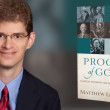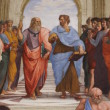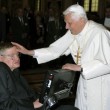Are Metaphysical First Principles Universally True?
by Dr. Dennis Bonnette
Filed under Philosophy, The Existence of God

Today, certain lines of attack against classical proofs for God’s existence, such as St. Thomas Aquinas’ Five Ways, seek to undermine foundational metaphysical first principles such as causality, sufficient reason, or even non-contradiction.1 Such attacks employ, for example, claims that (1) David Hume’s critique of causality is definitive, (2) the existence of the cosmos is simply a “brute fact,” needing no explanation, and (3) modern physics shows that the principle of non-contradiction... Read More
Proofs of God: An Interview with Dr. Matthew Levering
by Brandon Vogt
Filed under Interviews, The Existence of God

In his newest book, Proofs of God: Classical Arguments from Tertullian to Barth (Baker Academic, 2016), leading theologian Matthew Levering presents a thoroughgoing critical survey of the proofs of God's existence for readers interested in traditional Christian responses to the problem of atheism. Beginning with Tertullian and ending with Karl Barth, Levering covers twenty-one theologians and philosophers from the early church to the modern period, examining how they answered the critics... Read More
Modern Atheism: Dragging Plato Along Aristotle’s Coattails
by Timothy Gordon
Filed under Atheism

In today's Catholic Church, Platonism and Aristotelianism are often considered equal. It is a dangerous error that hails all the way back to the first neo-Platonists in the third century. Simply put, the true description of reality, rightly recognized by the Catholic Church, is that account given by Aristotle (not Plato!) and confirmed by Thomas Aquinas. But too many Catholics speak of Plato and Aristotle together, as if their metaphysics are identical. They are in fact nowhere near this.... Read More
Why Having a Heart of Gold is Not What Christianity is About
by Bishop Robert Barron
Filed under Morality, Religion

Many atheists and agnostics today insistently argue that it is altogether possible for non-believers in God to be morally upright. They resent the implication that the denial of God will lead inevitably to complete ethical relativism or nihilism. And they are quick to point out examples of non-religious people who are models of kindness, compassion, justice, etc. In point of fact, a recent article has proposed that non-believers are actually, on average, more morally praiseworthy than... Read More
Tolerance, Choice, Argument, and Religion
by Bishop Robert Barron
Filed under Religion

Pew Forum recently released the results of their study on religion in America. In accord with many surveys over the past fifty years, this poll showed that the vast majority (over 90%) of Americans believe in God but that an increasing number prefer their own spiritual experience to the dogmas and doctrines of traditional Christianity. Also, there is, among Americans, a general acceptance of positive, life-affirming beliefs but a deep suspicion of negative ideas such as divine judgment... Read More
Andrew Sullivan’s Non-Threatening Jesus
by Bishop Robert Barron
Filed under Culture, Jesus

A recent cover story for “Newsweek” magazine, penned by political and cultural commentator Andrew Sullivan, concerns the “crisis” that is supposedly gripping Christianity. Weighed down by its preoccupation with doctrines and supernatural claims, which are incredible to contemporary audiences, compromised by the corruption of its leadership, co-opted for base political ends, Christianity is verging, he argues, on the brink of collapse. The solution Sullivan proposes is a repristinizing... Read More
Has Stephen Hawking Made God Unnecessary?
by Trent Horn
Filed under The Existence of God

A few weeks ago, Stephen Hawking delivered a lecture at the California Institute of Technology titled "The Origin of the Universe," and you’re likely to have heard about it because, according to mainstream media outlets, Hawking has put God out of a job. In an article headlined “Stephen Hawking lays out case for Big Bang without God,” NBC News describes the presentation: Stephen Hawking began the event by reciting an African creation myth, and rapidly moved on to big questions... Read More






